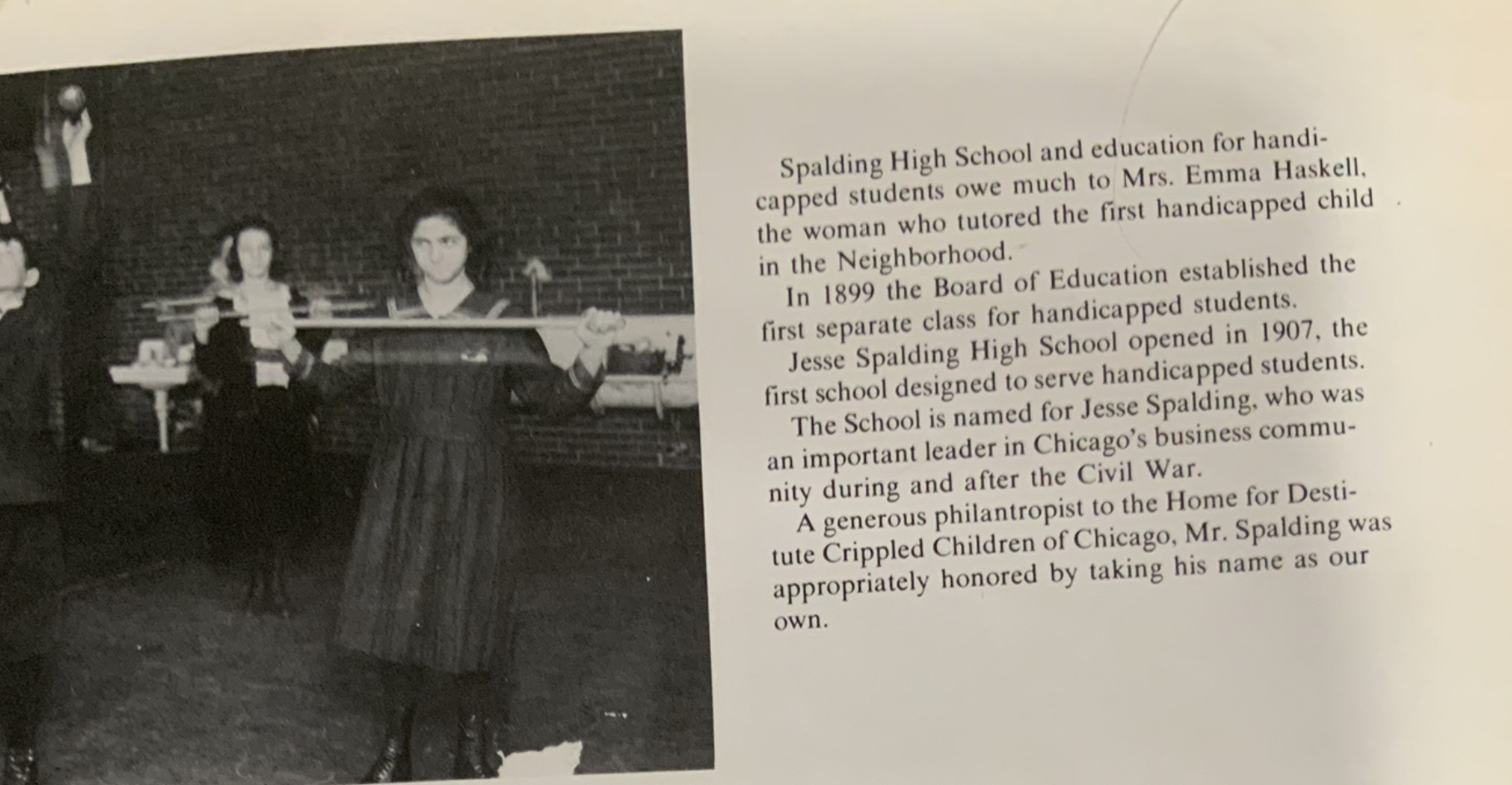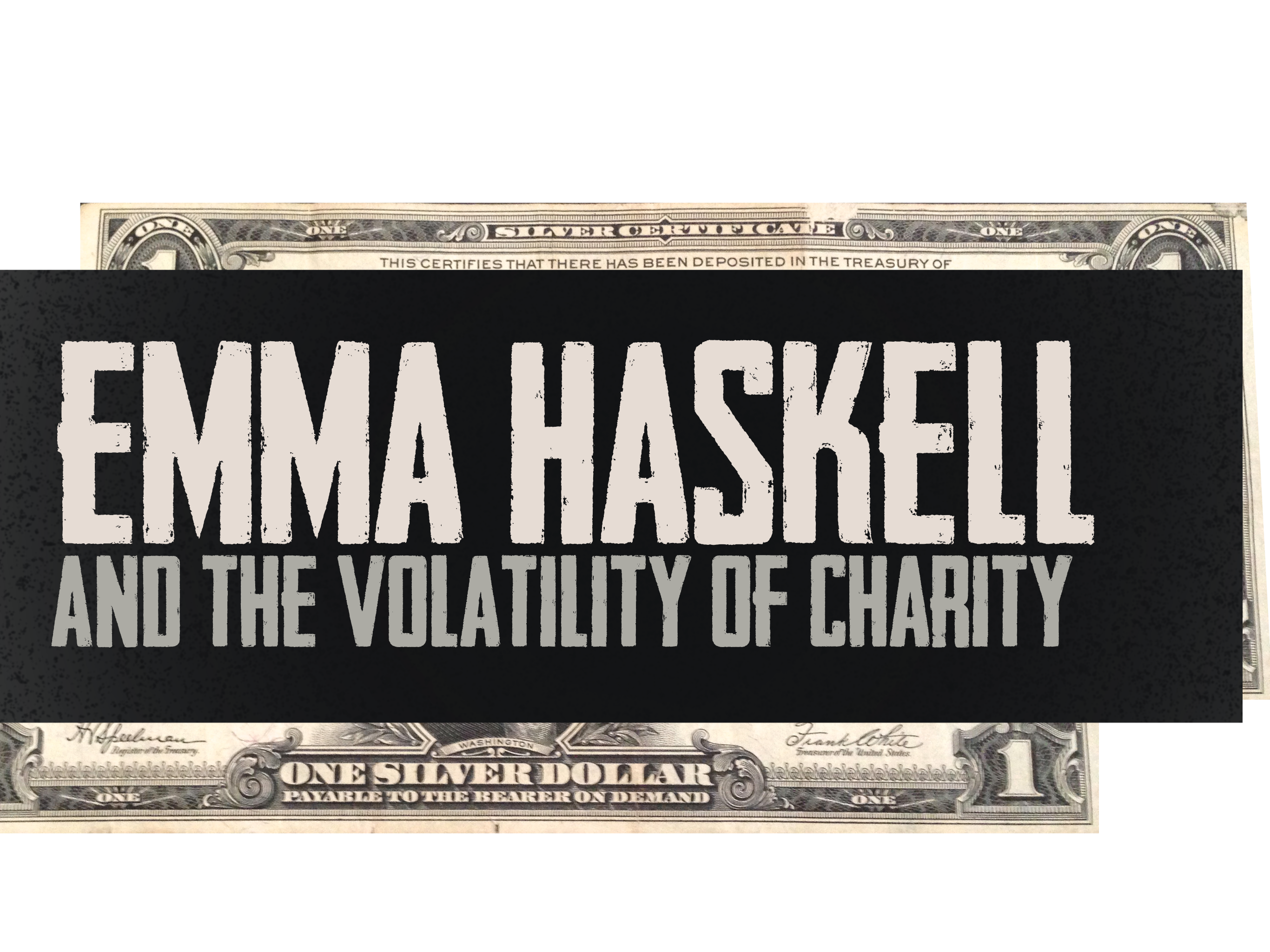Returning to the topic of the influence of philanthropy on Spalding's development, further research into the Chicago disability sphere brings us to the peculiar character of Emma Haskell. Haskell is described in the 1977 edition of Spalding's Yearbook as the woman who tutored the first handicapped child in the neighborhood, and to whom "Spalding High School and education for handicapped students owe much to" (The Torch). Haskell, far from an ordinary tutor, was the wife of a wealthy contractor, Franklyn Haskell, and was well connected in Chicago philanthropic and business scenes. Though the Haskells have posthumuously been represented as mostly benevolent turn-of-the-century Chicagoans (see: Emma Haskell school), they were not entirely free from controversy, both in business and interpersonal affairs (Destroys Deed to Spite Sister," Chicago Daily Tribune). Haskell, soon to become intimately involved with Spalding, began courting controversy years before her involvement at the school.

On June 27, 1900, Emma Haskell was appointed principal at the Home for Crippled and Destitute Children by acting superintendent Delano. When Superintendent Cooley later asked Haskell to confirm her eligibility for the records, of which she had no official record, he became suspicious of her qualifications as an acting principal of the newly incorporated school. After receiving only vague responses, the case of Emma Haskell was then scheduled to be brought up by the School Management committee of the Chicago Board of Education when it was reported that "no member of the board could explain how Mrs. Haskell's name came on the eligible list if she had not passed an examination and received a certificate," ("Eligibility is in Question," Chicago Daily Tribune). Of her teaching style, a member of the Board of Education referred to it as overly "sentimental," saying that, while Haskell had been "noble" in her work in education over the years, she frequently posed personal questions to her pupils such as "do you love me?" and "are you not happy here?" ("Says She is too Sentimental," Chicago Daily Tribune). Though this blurring of personal and professional boundaries may have been the norm amongst upper-class do-gooders and their charitable causes, this environment was not in line with the professional standards CPS was trying to foster at its public institutions.
On first glance, Emma Haskell was a seemingly experienced and well-equipped candidate for the principalship of Spalding. Haskell's reported supporters involved a great number of Chicago's high society, including George M. Reynolds, of the Continental National Bank, John A. Spoor, president of Union Stock Yard and Trading Company, Mrs. George R. Thorne, wife of Montgomery Ward's founder, and Mrs. Herman Falkenstein, founder and head resident of Settlement house at 783 Armitage avenue. In the press, representations of Haskell always took the form of a doting mother, always offering some warm platitude or holding a small child— representations, which, upon her involvement in the public politics of Spalding, would gleefully be twisted by reporters.
"If Mrs. Emma S Haskell [...] is not appointed principal of the new Spalding school," one Chicago Daily Tribune writer wrote, "it will not be for lack of earnest effort." Haskell, who was reported to have made $1,100 in contributions (approximately ~$33,000 today) to the school, seemed to have been under the distinct impression that she was entitled to the position of principal. While it is unclear what authority (if any) she was conferring with to make such claims to power, Haskell began her fight against the Chicago Board of Education immediately, first threatening to revoke her financial contributions from the project, then writing directly to one of the principle-elects in an effort to dissuade him from considering the position ("Renew Struggle for Mrs. Haskell," Chicago Daily Tribune.
One day in late March, the School Management Committee of the Chicago Board of Education gathered to hear testimony on charges of brutality and inappropriate behavior by principal Krauskopf, as well as counter charges of defiance of constituted authority by Krauskopf himself. The meeting was attended by Spalding educators, parents, and students, as well as a number of women "who [had] been interested in the school since it was a private school conducted by Mrs. Haskell alone," ( "Cripples Tell on Teacher," Chicago Daily Tribune) Two students— "little martyrs," as the press sardonically called them— alleged with their parents that Krauskopf had punched and dragged them, as well as had asked female students inappropriate questions and sent them home on the bus with a drunken policeman. From 8 at night to 2 o'clock in the morning, the School Management Committee deliberated on the charges. Finally, the committee reached an agreement. Due to unsatisfactory evidence, they found the testimony flimsy and dropped the charges against Krauskopf. Superintendent Cooley ordered the transfer of Haskell to a position at Greene school. According to her husband, Haskell was reported to have suffered a nervous breakdown from the stress surrounding the school and had in the meantime gone away to recover ( "Cripples Greet Teacher," Chicago Daily Tribune).
To the surprise of the newly appointed principal, Haskell's involvement with the institution did not end there. Within days of Mr. Krauskopf's appointment, retaliation by Spalding's former principal, was already underway. Before the beginning of the school year, almost the entire teaching staff of Spalding resigned in solidarity with Haskell. In late April, Krauskopf was confronted with the sudden and unexpected confiscation of the school's printing press, type cases, and type stand, among other teaching tools in vocational programs. A few days later, a number of library books were taken as well. These resources, as reported by the Chicago Daily Tribune, were gifted to Spalding by a number of "private persons" and the teamsters ("Teacher's Allies Strip School," Chicago Daily Tribune).
Throughout this dramatic coverage, it was heavily implied that Haskell was attempting to sabotage the school she had been personally invested in for years by taking advantage of the trust and relationships she's built with the community. Though it would be somewhat inept to outright condemn the motivations of the charitable in lieu of any real alternative in terms of the legal rights and protection of disabled people, it is important to recognize that the holy mission these benevolent do-gooders touted is still undoubtedly self-serving. In charity work, one can hire the best doctors, follow the latest science, and seek advice from the most trusted experts. But, at the end of the day, the purpose of charity is to supplement the shortcomings of public policy, not work from within it. In this way, charity is a largely individualistic pursuit. Thus, Spalding's conception is representative of a very specific intersection in time, where the growing movement for the legal and social protection of disabled people and the ego-steeped culture of the philanthropic Progressive Era dramatically came to head.
Sources
"Cripples Greet Teacher." Chicago Daily Tribune, March 31, 1908.
"Cripples Tell on Teacher." Chicago Daily Tribune, March 24, 1908.
"Destroys Deed to Spite Sister." Chicago Daily Tribune, December 19, 1912.
Eligibility is in Question." Chicago Daily Tribune, April 17, 1908.
"Educational Press Bulletin" March, 1948. West Side Council of Parents and Teachers Records, [Box 5, folder 11], Special Collections, Chicago Public Library
Fleischer, Doris Zames, and Frieda Zames. The Disability Rights Movement: From Charity to Confrontation. Philadelphia: Temple University Press, 2011.
"M'Cahey Tells Why Miss Igoe Heads Spalding." Chicago Daily Tribune, February 8, 1942.
"Says She is too Sentimental." Chicago Daily Tribune, April 1, 1908.
"Some Outstanding Features in the Education of the Handicapped at Spalding School, Chicago, Illinois." West Side Council of Parents and Teachers Records, [Box 5, folder 11], Special Collections, Chicago Public Library
"Spalding School helps handicapped find place in society," Chicago Tribune. August 7, 1977.
Spalding High School, The Torch (Chicago, IL: 1977), 3, Newberry Library
"Renew Struggle for Mrs. Haskell." Chicago Daily Tribune, March 31, 1908.
Teacher's Allies Strip School." Chicago Daily Tribune, April 24, 1908.
